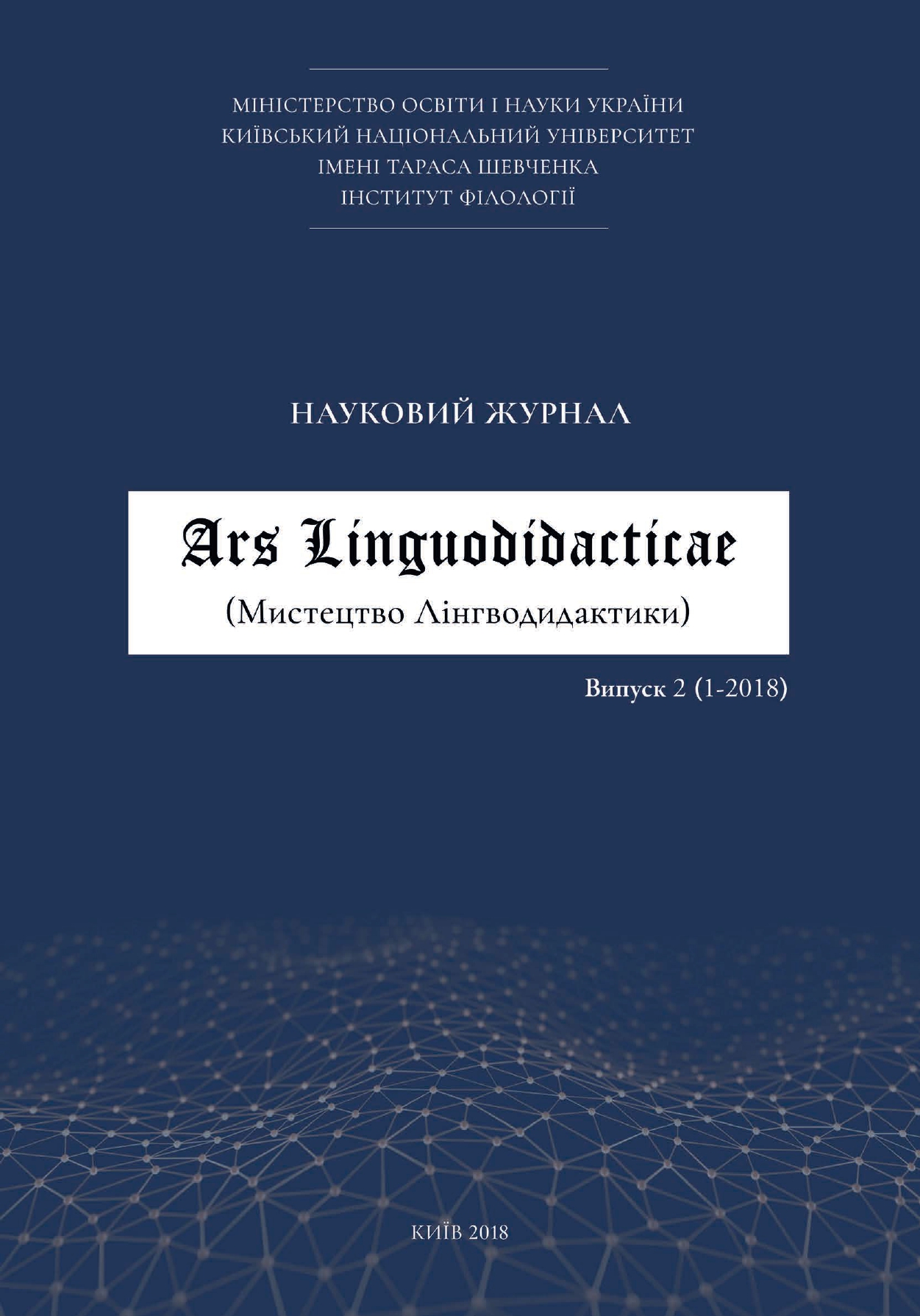ФОРМУВАННЯ В МАЙБУТНІХ ВИКЛАДАЧІВ КЛАСИЧНИХ МОВ МЕТОДИЧНОЇ КОМПЕТЕНТНОСТІ МЕТОДОМ ПРОЕКТІВ
DOI:
https://doi.org/10.17721/2663-0303.2018.2.04Ключові слова:
класичні мови, латинська мова, давньогрецька мова, методична компетентність, метод проектів, критерії оцінювання методичних проектів, методичний проектАнотація
У статті окреслено поняття методичної компетентності викладача класичних мов – латинської та давньогрецької, визначено зміст методичної компетентності: конкретизовано знання, уміння, здатність та готовність майбутніх фахівців із класичних мов здійснювати педагогічну діяльність. Розроблено сім навчальних проектів, які корелюють з компетентностями, що мають опанувати студенти вищих навчальних закладів під час вивчення класичних мов – лексичною, граматичною, лінгвосоціокультурною, читацькою. Розроблено критерії та норми оцінювання методичних проектів студентів. Обґрунтовано, що використання творчих короткострокових проектів є за порукою успішного формування методичної компетентності майбутніх викладачів класичних мов.
Посилання
Arakava M.V. (2007). Formirovaniye metodicheskoy kompetentsii v obuchenii chteniyu na yaponskom yazyke u studentov starshikh kursov pedagogicheskikh vuzov: yaponskiy yazyk kak vtoroy inostrannyy (Аракава М.В. Формирование методической компетенции в обучении чтению на японском языке у студентов старших курсов педагогических вузов : японский язык как второй иностранный : автореферат дис. ... кандидата педагогических наук : 13.00.02 / Аракава Мария Валерьевна; [Место защиты: Рос. гос. пед. ун-т им. А.И. Герцена]. – Санкт-Петербург.. – 24 с.). Print.
Bígich O. B. (2006). Teoríya í praktika formuvannya metodichnoí̈ kompetentsíí̈ vchitelya í nozemnoí̈ movi pochatkovoí̈ shkoli (Бігич О.Б. Теорія і практика формування методичної компетенції вчителя іноземної мови початкової школи: Навчальний посібник. – К.: Ленвіт, 2006. – 200 с.). Print.
Ibragimova L.A., Kompetentnostnyy podkhod: metodologicheskaya osnova sovremennogo obrazovaniya (Competence approach the methodological basis of modern education) / Ibragimova L.A., Petrova G.A., Trofimenko M.P. // Vestnik NVGU. 2010. №1. URL: http://cyberleninka.ru/article/n/kompetentnostnyy-podhod-metodologicheskaya-osnova-sovremennogo-obrazovaniya (data obrashcheniya: 28.01.2018).
Khodykina A.V. (2011). Formirovaniye metodicheskoy kom petentsii bakalavra pedagogiki v oblasti inostrannykh yazykov na osnove integrativnogo podkhoda (Ходыкина А.В. Формирование методической компетенции бакалавра педагогики в области иностранных языков на основе интегративного подхода: английский язык, языковой факультет: диссертация ... кандидата педагогических наук: 13.00.02 . – М, – 186 с.). Print.
Mayêr N.V. (2015). Formuvannya metodichnoy kompetentnostі u maybutnikh vikladachiv frantsuz’koi movi: teoriya í praktika. Monografíya / Natalíya Vasilívna. – K.: Vid. tsentr KNLU. (Майєр Н.В. Формування методичної компетентності у майбутніх викладачів французької мови: теорія і практика. – К.: КНЛУ, 2015. – 471 с.) Print.
Polat Ye. (2004). Metod proyektov: tipologiya i struktura (Полат Е. Метод проектов: типология и структура // Лучшие страницы педагогической прессы. – №1. – С. 9–17). Print.
Semenova Ye. (2007). Formirovaniye professional’noy kompetentnosti budushchikh uchiteley inostrannogo yazyka na osnove kontekstnogo podkhoda (Семенова Е.С. Формирование профессиональной компетентности будущих учителей иностранного языка на основе контекстного подхода : автореферат дис. ... канд. пед. н.: 13.00.08. – Йошкар-Ола, 2007. – 25 с.). Print.
Solovova N.V. (2010). Metodicheskaya kompetentnost’ prepodavatelya vuza (Methodical competence of the teacher of the university): Monografiya. M.: Izd vo APK i PPRO. Соловова Н.В. Методическая компетентность преподавателя вуза: монография. – М.: Изд-во Академии повышения квалификации, 2010.– 323 с.). Print.
Tatarnitseva S. (2003). Metodicheskaya kompetentsiya uchitelya i yeye formirovaniye v protsesse samostoyatel’noy raboty studentov (Татарницева С.Н. Методическая компетенция учителя и ее формирование в процессе самостоятельной работы студентов: автореферат дис. ... кандидата педагогических наук: 13.00.08 / Сам. гос. пед. ун-т. – Тольятти, 2003. – 21 с.). Print.
Yevseyev A.B. Kompetentnostnyy podkhod k professional’no-yazykovoy podgotovke menedzherov turizma v vuze (Евсеев А.Б. Компетентностный подход к профессионально- языковой подготовке менеджеров туризма в вузе: автореферат дис. ... кандидата педагогических наук: 13.00.08 / Евсеев Андрей Борисович; [Место защиты: Моск. гос. ун-т культуры и искусств]. – М., 2011. – 24 с.). Print.
##submission.downloads##
Опубліковано
Як цитувати
Номер
Розділ
Ліцензія
Авторське право (c) 2018 В’ячеслав Шовковий

Ця робота ліцензується відповідно до Creative Commons Attribution-ShareAlike 4.0 International License.
Ця робота ліцензується відповідно до Creative Commons Attribution-NonCommercial 4.0 International License.
Політика охорони авторських прав відповідно до умов ліцензії: Creative Commons Attribution-NonCommercial (Атрибуція-Некомерційне використання) 4.0 Міжнародна (CC BY-NC 4.0).
Автори, що публікують свої статті в журналі "Ars Linguodidacticae" (журналі відкритого доступу) зберігають за собою такі права:
- Автори зберігають за собою права на авторство своєї статті та надають журналу "Ars Linguodidacticae" право першої публікації рукопису своєї статті на умовах ліцензії Creative Commons (CC BY-NC 4.0) Attribution License, яка дозволяє іншим особам вільно розповсюджувати опубліковану роботу з обов'язковим посиланням на автора оригінальної роботи та першу оригінальну публікацію в журналі "Ars Linguodidacticae". Інформація про збереження права на авторство надається на титульній сторінці статті.
- Автори зберігають за собою право укладати окремі угоди на неексклюзивне розповсюдження своєї статті у тому вигляді, в якому вона була опублікована в журналі "Ars Linguodidacticae" (наприклад, розміщувати статтю в електронних бібліотеках, архівах та каталогах або публікувати у складі інститутських збірників та монографій), за умови обов'язкового повного посилання на першу оригінальну публікацію в журналі "Ars Linguodidacticae".
- Політика журналу "Ars Linguodidacticae" дає змогу та заохочує розміщення авторами в мережі Інтернет (наприклад в інститутському репозитарії або на персональному сайті) рукопису роботи як до її подання до редакції, так і під час її редакційного опрацювання, оскільки це сприяє продуктивній науковій дискусії та позитивно позначається на оперативності й динаміці цитування статті.
Редакція журналу зберігає за собою видавничі права на:
- зверстані оригінали статей та весь номер журналу;
- оформлення журналу, а також оригінальні ілюстративні та додаткові матеріали;
- репринтні перевидання журналу в друкованому та електронному вигляді.
Політика охорони авторських прав провадиться відповідно до умов ліцензії: Creative Commons Attribution-NonCommercial (Атрибуція-Некомерційне використання) 4.0 Міжнародна (CC BY-NC 4.0).
Для отримання додаткової інформації, будь ласка, прочитайте повний текст Публічної ліцензії CC BY-NC 4.0
Creative Commons Attribution-NonCommercial 4.0 International License.


